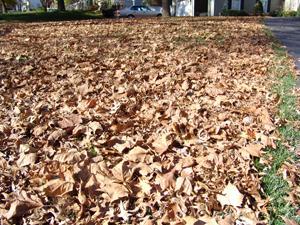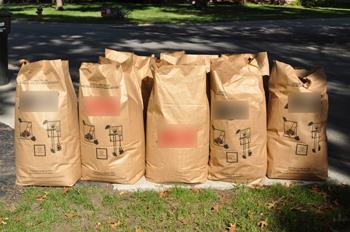Solutions for getting rid of fall’s abundant leaves

One of life’s yearly challenges is raking the leaves that cover the lawn. It used to be that we thought nothing of raking them up, filling trash bag after trash bag and sending them off to the landfill. In today’s politically correct society, we should look for ways to avoid sending this bulky yard waste to the landfill and leave valuable space for other trash.
Alternatives for leaf disposal 
There are several alternatives for getting rid of fall's leaves. Not all of these solutions will work for everyone, but with a little thought, we can all do our part to keep the leaves out of the waste stream.
Composting fall leaves
Composting is one option for disposal. Leaves alone are difficult to decompose, but when mixed with a few grass clippings, composted manure or generous amounts of fertilizer, the leaves will be reduced to wonderful organic matter usable in the garden. If space is available, the leaves can be stockpiled and left to rot on their own. However, this will take quite a bit of time.
Fall leaves as mulch
Another option for leaf disposal is to use the leaves as a mulching material. Using fallen leaves as mulch is easy and saves money.
The best way to collect the leaves is by using the lawn mower bagging attachment. Collecting the leaves with the mower helps to shred and greatly reduces the bulk. Once collected, the leaves can be spread around the bases of young trees or shrubs, or used to cover bare soil areas in the flower garden. The leaf layer will provide additional organic matter as they decompose and help conserve moisture and control weed growth.
Try this. Mow the leaves twice, which decreases the bulk even more. First mow the lawn without the bagger attachment. Then on the second pass, collect the leaves. The result is finely chopped material that resembles some of the expensive mulching materials. Leaves break down quickly as a mulch layer, which means additional mulch will need to be applied.
Stockpile leaves and use later
The leaves can also be stockpiled over winter and used the following spring. Fill large compost bins with shredded leaves and mulch the vegetable garden the following spring. At the end of the season, simply till them into the soil for added organic matter.
Put fall leaves into the garden to increase organic matter
Finally, the leaves can be incorporated into the garden this fall. Spread a couple inches over the garden and work into the soil. Mother Nature will compost them over the winter.
Disposing of leaves requires you to be creative and proactive so they do not end up in the landfill. We have enough trash and waste to dispose of without adding tree leaves. We can also keep on wishing for that Midwest windstorm that blows all the leaves off our yard, without giving us someone else’s. Oh, aren’t wishes wonderful?
Johnson County Extension Resources
Videos
- Tired of Raking? Try Mulch Mowing
- Sweep or blow Leaves and Grass Clippings Back onto the Lawn
- Mulch Mowing Leaves Back Into the Lawn here in Johnson County, KS
Have questions?
The Garden Hotline is staffed by trained EMG volunteers and Extension staff who will assist you with questions.
Phone: (913) 715-7050
Email: garden.help@jocogov.org